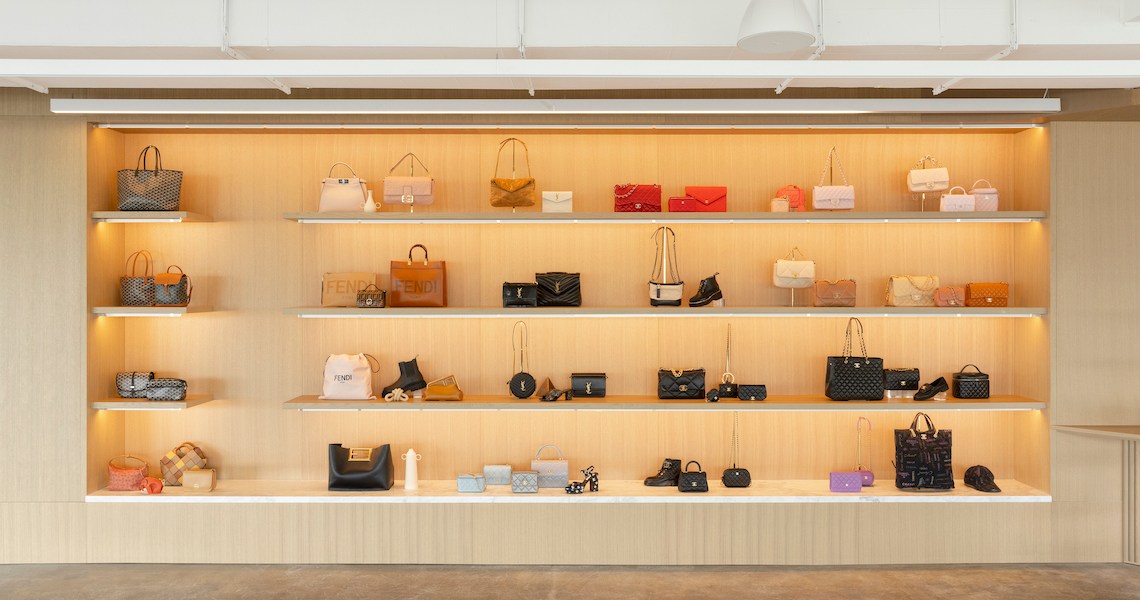On May 27, luxury reseller Fashionphile opened a showroom and retail space in New York City’s Chelsea neighborhood.
It’s a multipurpose destination, housing a processing center for new products, an office, authentication rooms, a photography studio, storerooms full of hundreds of handbags and a showroom for clients. The new location makes Fashionphile the latest luxury reseller to invest heavily in brick-and-mortar spaces, along with contemporaries Vivrelle and The RealReal. The amount of investor money, growth and new physical locations these platforms are seeing signify resale’s growing prominence.
Most of the current crop of luxury resellers, including Fashionphile, Vivrelle and The RealReal, got their start online. Even now, 90% of Fashionphile’s customers have only ever bought or sold through the company’s online marketplace, according to founder Sarah Davis. But after selling $8 million worth of handbags out of a small retail space in Carlsbad, California in 2021 and seeing 70% of shoppers make a purchase, Davis was convinced that having a larger physical space could reap bigger returns.
“If we could sell $8 million in Carlsbad, what could we sell in Chelsea?” Davis said.
The Chelsea location is a much grander affair than the California showroom, befitting of Davis’s lofty ambitions. The showroom includes windows into the behind-the-scenes parts of Fashionphile’s business, allowing customers to get a peek at the photography studio (where new pieces are photographed 8-10 times before making their way on the site) and the authentication center where Fashionphile employees inspect every piece that comes through.
But the centerpiece of the location is a carousel, much like a baggage claim at an airport, where bags from the back storerooms, called “The Cage,” are sent out for pick-up by customers. “The Cage” houses more than 15,000 bags. Virtually any item sold to Fashionphile anywhere east of the Mississippi River will get processed there.
Davis said the New York City locale is an extension of the company’s digital roots.
Ad position: web_incontent_pos1
“Let’s say you go on the Fashionphile site, you filter to only show pieces we have in stock here at the Chelsea location,” Davis said. “You pick out the ones you want and make an appointment to come check them out. When you get here, the Wi-Fi [equipped] environment recognizes your phone and sends the pieces you picked out on the carousel.”
Davis believes the high-touch digital element puts Fashionphile in a class of its own when compared to other resale competitors, both big and small.
“I love flea markets, but that’s not what we’re trying to do here,” she said.
Fashionphile’s new showroom is meant to resemble an actual luxury retail store, with just as much emphasis on curation and product as a Chanel or Hermès location.
“We pride ourselves on providing best-in-class service to our customers, and this move enables us to expand our capabilities even further as the leading re-commerce company for ultra-luxury accessories,” said Ben Hemminger, CEO of Fashiophile.
Ad position: web_incontent_pos2
Fashionphile isn’t alone in its re-defintion of consignment retail. Vivrelle is opening a 14,000-square-foot retail store and social club in NYC on June 7. Like Fashionphile, Vivrelle’s location is meant to be an “elevated experience,” a rep for the company said. It includes a lounge and a bar with alcoholic and non-alcoholic drinks, and will feature a rotating series of in-person events and activations.
The opening comes after Vivrelle raised $26 million in funding in April.
As online customer acquisition costs have gone up, physical stores are a smart way for resellers to bring in new audiences. The RealReal has 16 stores, the latest of which opened in Brentwood, California in February. The RealReal also runs three consignment offices that are just for selling and consultations. Thirty percent of its new customers come from physical stores.
“Our strategy on stores is the same as last quarter,” said Rati Sahi Levesque, president of The RealReal, on the company’s first-quarter earnings call in May. “We’re opportunistic, as far as locations go. If we find real estate that looks enticing, we’ll definitely take them up on it.”




